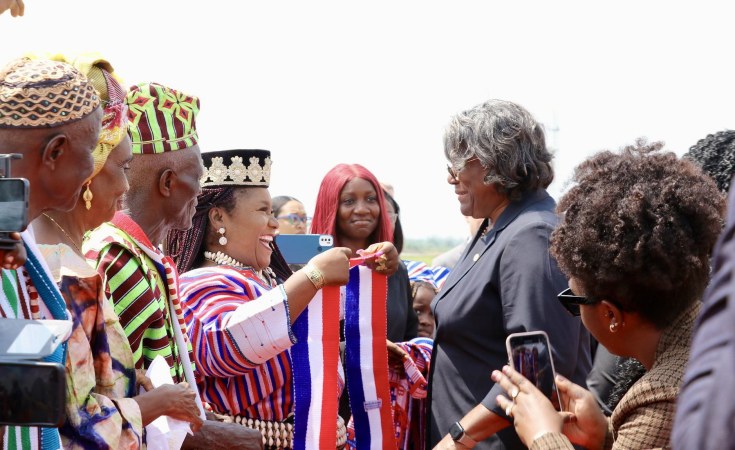United States Ambassador-at-Large for Global Criminal Justice has assured Liberians that her government stands ready to lend the needed support for the establishment of a war and economic crimes court in the country
"The U.S. government looks forward to working with all Liberians to make the court a reality," Ambassador Beth van Schaack, who has been on a few days' mission here, said in her farewell statement that was posted on the U.S. Embassy website.
In a tone that denotes a successful mission, an all-smiled Schaack added that she is "Leaving on a great note," as she performed what is becoming known as the 'Liberian handshake' with President Joseph Nyuma Boakai.
"The U.S. government looks forward to working with all Liberians to make the court a reality," she said. "It was a privilege and honor to meet with President Boakai, following his pledge to establish a War and Economic Crimes Court in Liberia."
During her visit here, Ambassador Van Schaack met with a wide cross-section of government officials and civil society groups committed to delivering justice.
The momentum for the establishment of the War and Economic Crimes Court (WECC) in Liberia is gaining significant traction as the House of Representatives voted unanimously to endorse a resolution for its establishment.
A majority of members (49) of the House of Representatives on Tuesday, March 5, during the 16th day sitting, affixed their signatures to the instrument, signaling a milestone that, at long last, perpetrators of heinous crimes and plunderers of the Liberian state are at the verge of being held to account for their actions.
The House's decision is unprecedented as it marks the first time since the Civil War that such action has been taken by the Legislature.
Proponents have long advocated for justice through the establishment of a court to address wartime atrocities.
Despite past delays and diverging proposals, the renewed push for accountability highlights a growing consensus among various stakeholders in Liberia.
The US Government, through the State Department, has been pushing for the establishment of the court, negotiating with national stakeholders for the realization of this effort. Three days ago, Van Schaach and a team from the Global Criminal Justice (J/GCJ) had an exhaustive but private meeting with the Speaker of the House of Representatives J. Fonati Koffa, and some members of the House's leadership at the Capitol.
The meeting led to a reintroduction of a resolution to establish the WECC. The majority of members of the House have reaffirmed support and called on President Joseph Nyuma Boakai to work with the United Nations, international partners, institutions, and civil society organizations for assistance in establishing the "Extraordinary Criminal Court" in Liberia.
The establishment of a WECC is a recommendation contained in the final report of the Truth and Reconciliation Commission, which was established to investigate the root causes of the nearly three decades of civil crises.
The Act creating the TRC gave wide powers to the commission, including recommending prosecution. The TRC in its final report recommended the creation of an extraordinary criminal court, which would be a hybrid court composed of Liberian and international judges, prosecutors, and other staff with a mandate to try those allegedly responsible for committing serious crimes.
However, for the next decade, the TRC recommendation languished.
For Ambassador Van Schaack, the TRC has some useful recommendations to address war crimes and atrocities. "We encourage those in positions of power to look very carefully at those recommendations. It is never too late to dispense justice. The individuals who suffered the crimes are still calling for justice and those who represent them should look into those calls," the ambassador said back in October during her first visit here.
In an emotional open letter addressed to Liberians on December 13, 2022, after her first visit, van Schaack said, "Liberia faces many challenges when it comes to justice and accountability, not only for the terrible war crimes committed during two consecutive civil wars but also for subsequent crimes and corruption.
She added that impunity is corrosive and, when it is allowed to flourish in one sector, "it will undermine the foundations of peace and the rule of law across an entire society."
"The TRC commissioners were tasked with the awesome responsibility for generating a framework to prevent a return to mass violence in Liberia, answer the call of victims and survivors for justice, and hold accountable those most responsible for war crimes and other atrocities," she said.
Like Schaack and many good friends of Liberia in the US administration, Liberians anticipate for the establishment of the Extraordinary Criminal Court for Liberia, with a mandate to investigate war crimes and economic crimes.
With over two decades since the civil crises ended, the only justice Liberians have enjoyed to date has occurred in foreign courts.
Some of these include the verdict in France against Kunti Kamara, who was sentenced to life imprisonment for complicity in crimes against humanity, torture, and acts of barbarism; cases in U.S. courts against former rebel general Laye Sekou Camara and former Armed Forces of Liberia commander Moses Wright for charges related to misrepresenting their wartime conduct on immigration forms in attempts to evade accountability.
There was a civil judgment in Pennsylvania against Moses Thomas, establishing his liability for the Lutheran Church massacre and resulting in an $84 million damages award to victims.
This judgment has not been paid because Thomas absconded from the United States. There was also a lawsuit filed at the ECOWAS Community Court of Justice on behalf of the survivors of the massacre at St. Peter's Lutheran Church. The crux of the survivors' claim is that their country has failed to provide them justice.
Schaack and many other WECC proponents, both local and international, say it is high time that Liberian authorities provide the opportunity for victims of the civil war to seek justice -- and this seems well on course as the House of Representatives now leads the process.


